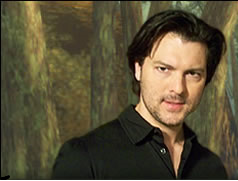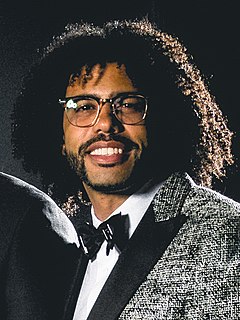A Quote by David Hayter
If you can get an audience to identify themselves with a character, they will subconsciously feel that their own lives are in danger. People tend to pay attention in situations like that. I think fear is the easiest, and most visceral, emotion to activate in an audience.
Related Quotes
I always want the audience to identify with my character in some way. I mean, sometimes you'll get characters that aren't very identifiable. Sometimes you can't relate to your character at all. I think it's important to keep the audience interested. But the best advice that I've gotten is to live in the moment.
In film, the camera can get an array of shots so the audience can see the emotion the character is giving off. Using close-ups on the character's face really helps get the message across. On stage, you can't do that. But the stage has that live feeling that you can't get anywhere else because the audience is right there.
What I react against in other people's work, as a filmgoer, is when I see something in a movie that I feel is supposed to make me feel emotional, but I don't believe the filmmaker shares that emotion. They just think the audience will. And I think you can feel that separation. So any time I find myself writing something that I don't really respond to, but I'm telling myself, 'Oh yes, but the audience is going to like this,' then I know I'm on the wrong track and I just throw it out.
I think that if you make something that's relatable then people will attach themselves to it. You can express it in a lot of different ways but I feel like as long as you are consistent and fair with the audience they'll engage irrespective of how they self-identify. I think it just gets too complicated to track all those differences between demographics.
If I can get the audience to connect with the characters emotionally - and they love who they are, they love the larger-than-life situation that they're in, but most of all get the audience invested in the characters - then I always feel like I can sort of put them in the most outrageous circumstances, and the audience is okay to go with that.
Until a character becomes a personality it cannot be believed. Without personality, the character may do funny or interesting things, but unless people are able to identify themselves with the character, its actions will seem unreal. And without personality, a story cannot ring true to the audience.
At the end of the day, I really go with my personal taste and with what's on the page in terms of character. But beyond that, there's a complexity about the scripts I tend to respond to. I've not lost my curiosity about how the world functions. And a script that can embody that and thematically explore bigger questions in a way which seems fresh is likely to get my attention. Frankly, I also have an eye for what will appeal to an audience, as opposed to a self-indulgent exercise that isn't taking the audience into account.
What I love most about playing in front of people has something to do with a certain kind of energy exchange. The attention and appreciation of my audience feeds back into my playing. It really seems as if there is a true and equal give and take between performer and listener, making me aware of how much I depend on my audience. And since the audience is different every night, the music being played will differ too. Every space I performed in has its own magic and spirit.



































